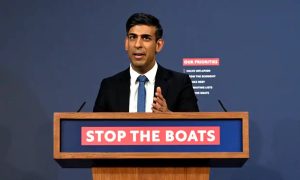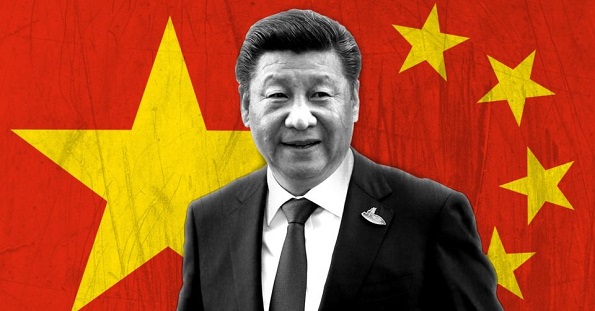On November 15 2023, the UK Supreme Court ruled unanimously that the government’s policy of deporting asylum seekers to Rwanda was unlawful. Prime Minister Rishi Sunak’s response and the potential shift in focus on this issue is emblematic of the dilemma he faces ahead of the next general election over which groups of voters he should be appealing to.
The ‘Rwanda policy’ was initially proposed by the UK Government in April 2022 and would have seen the government send asylum seekers, as well as those who had arrived in the UK illegally, to Rwanda while their asylum claims were being processed. If someone’s application for refugee status was successful, they would receive the right to stay in Rwanda rather than return to the UK. 
Protestors in front of the Supreme Court / Source: Leon Neal via Getty Images
The first flight carrying asylum seekers to Rwanda was stopped from taking off in June 2022 following an injunction from the European Court of Human Rights (ECtHR) against the policy, with the UK Court of Appeal, now followed by the Supreme Court, ruling against the policy.
Why did the Supreme Court come to this conclusion?
The court sided with the Court of Appeal in agreeing that the policy would pose a significant risk of refoulement. Refoulement occurs when asylum seekers are returned (either directly or indirectly) to their country of origin, making them vulnerable once again to the ill-treatment they were evading by leaving their country of origin.
Various international treaties and conventions, of which the UK is a member, do not allow refoulement. These include the European Convention on Human Rights (ECHR), the UN Refugee Convention, and the UN Convention against Torture. As these have been integrated into UK law through the Acts of Parliament, the Supreme Court ruled that the Rwanda policy was unlawful.
Alongside arguments about its legality, one of the key questions answered by the Court was whether Rwanda would be a safe country to send asylum seekers to. Evidence from organisations such as the UN High Commissioner for Refugees (UNHCR) suggested that systemic flaws in the Rwandan legal system meant that claims may not be fairly processed. These included the potential for the political influence of judges, some defendants not being provided with lawyers, and practical difficulties in the appeals processes.
Additionally, the Supreme Court received over 100 examples showing evidence of refoulement from Rwanda, including some which had taken place following the Rwandan government’s agreement with the UK government in 2022. Therefore, while the justices argued that the policy could be amended to address the risk of refoulement, the changes necessary for it to be lawful would be substantial.
How will this impact the next General Election?
Rishi Sunak’s press conference on the Rwanda Policy on 7th March 2023 / Source: Leon Neal via Getty Images
Prime Minister Rishi Sunak initially outlined migration as a key issue from his first day in office, his pledge to “stop the boats” being one of the five priorities he set out for his government. Despite this, he has been ambiguous on migration policy since the Supreme Court’s ruling. For example, having initially said a renegotiated agreement would be announced with Rwanda days after the ruling, Downing Street recently refused to commit to a specific date for this. A spokesperson for the PM said that this delay was due to the government working to ensure the policy can have “the best possible chance of success”.
Sunak’s recent cabinet reshuffle suggests there could be a shift towards moderation on this policy. This is best exemplified through replacing former Home Secretary Suella Braverman with James Cleverly. While still advocating for limiting migration and the Rwanda policy in some form, he does not see it as “the be all and end all”, compared to his predecessor who viewed the policy as a “dream” and an “obsession”.
The toning down of the “stop the boats” messaging suggests a broader shift in the types of voters Sunak will attempt to win over in the next General Election. Messaging on issues such as LGBTQ+ rights, protests, and environmental policy have typically resonated far more with the northern, socially conservative voters that the Conservatives did well with during the 2019 general election campaign, helping them to win many Labour safe seats. Moderation on this policy has the potential to cause Conservative candidates to lose seats to Reform UK, a new political party that has far stronger anti-immigration views, with Reform leader Richard Tice recently calling for the Home Office to be abolished due to their failures on migration policy.
Migration and other issues related to social policy could split votes between candidates on the right: this would help Labour to have better electoral prospects in Red Wall constituencies, such as the North East and the West Midlands. Given Labour’s uptick in support from southern and socially liberal voters since the 2019 Election, as well as the Liberal Democrats’ typical strong support from these voters, this strong immigration rhetoric (amongst other policies) could alienate voters in these traditional Conservative strongholds.
Therefore, this current electoral strategy could result in the Conservatives having one of their worst electoral performances in history if they cannot retain a strong base of support in any part of the country. Many current electoral forecasts show them winning in as little as 135 constituencies in some models, meaning Labour’s electoral gains at the next election could reach Blair’s levels of success. This could also have the potential of embarrassment for some MPs, with senior Conservative figures such as Chancellor Jeremy Hunt and former Leader of the House of Commons Jacob Rees-Mogg being projected as likely to lose their seats.
This shift towards moderation on migration policy can be interpreted as an attempt to retain these traditional Conservative seats, as a way of limiting these losses. Sunak’s recent cabinet appointments and shift in economic policy towards tax cuts in the Autumn Statement would suggest an attempt to win back the “Blue Wall” voters that the Conservatives traditionally do so well with, in regions such as the Home Counties and the South East. 
David Cameron speaking on his appointment as Foreign Secretary / Source: Andy Rain via Shutterstock
Another method Sunak has used to go about this is promoting many figures from the moderate wing of the Conservative Party, such as Laura Trott and Victoria Atkins, with the most notable example being appointing former Prime Minister David Cameron as the new Foreign Secretary. This shift in the ideological make-up of the Cabinet towards the centre-right could therefore be an attempt to appeal to these traditional Conservative voters.
Moderation – to be or not to be?
The political question Sunak must answer on the Rwanda policy is emblematic of the electoral dilemma he is faced with: advocate for more radical policies and rely on the coalition of voters that led his party to victory in the 2019 General Election, or try to engage in damage control for their traditional voter base, to ensure that the party has the MPs and support necessary to bounce back from a likely loss at the next general election? The path he chooses to achieve this through the Rwanda policy and other policy areas will therefore be a deciding factor in the Conservatives’ electoral performance at the next General Election.
by Sean Moran
Cover image: At the Supreme Court by Anthony O’Neil via Wikimedia Commons







